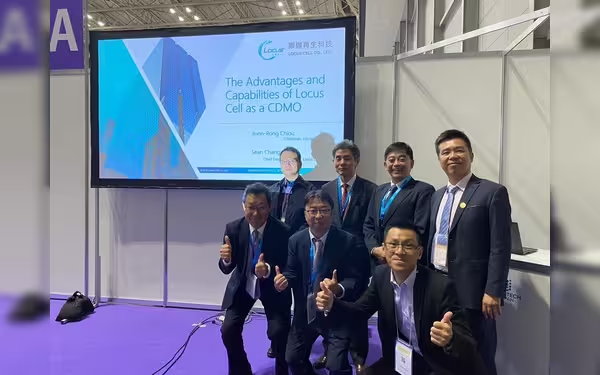Saturday, November 16, 2024 05:37 PM
Locus Cell Set to Lead Regenerative Medicine at BIOJAPAN 2024
- Locus Cell to showcase advancements at BIOJAPAN 2024.
- New plant in Zhubei aims for largest cell therapy production in Asia.
- Taiwan's regulatory changes boost regenerative medicine industry.
 Image Credits: prnewswire_apac
Image Credits: prnewswire_apacLocus Cell prepares to showcase innovations in regenerative medicine at BIOJAPAN 2024, highlighting its new plant and Taiwan's supportive regulations.
In recent years, the global biopharmaceutical landscape has been undergoing significant changes, particularly in the field of regenerative medicine. This innovative area focuses on repairing or replacing damaged cells, tissues, and organs, offering hope for patients with severe health conditions. As the demand for advanced medical solutions grows, companies worldwide are striving to enhance their capabilities and expand their reach. One such company making waves in this sector is Locus Cell, a leading regenerative medicine firm from Taiwan.
At the upcoming BIOJAPAN 2024 event in Yokohama, Locus Cell (6891) is set to showcase its advancements and plans for the future. Recently, the company celebrated a major milestone with a beam-raising ceremony for its new plant in Zhubei, which is expected to be completed by 2025. This facility is anticipated to become the largest cell therapy production base in Asia, emphasizing Locus Cell's commitment to meeting the increasing market demand for regenerative medicine products.
The design of Locus Cell's new factory focuses on mass production, which is crucial for improving both efficiency and product quality. In a strategic move, the company has partnered with the Hitachi Group to create a comprehensive Contract Development and Manufacturing Organization (CDMO) service system. This collaboration has already resulted in securing orders from Japan, highlighting the growing international interest in Locus Cell's offerings.
Chairman Jiunn-Rong Chiou expressed optimism about the recent legislative changes in Taiwan, specifically the passage of the "Regenerative Medicine Act" and the "Regenerative Medicine Product Act." These laws are expected to significantly impact the cell therapy industry by establishing a conditional approval system for regenerative medical products aimed at treating life-threatening or severely disabling diseases. This regulatory framework allows Taiwan to introduce cutting-edge medical technologies that are still in Phase II clinical trials internationally, thereby accelerating the process of bringing these therapies to market.
Chiou emphasized Locus Cell's readiness to meet international standards, stating, "We are fully equipped to undertake cell product orders that meet international standards and provide high-quality services to clients in Japan and other countries." This capability is particularly important in today's shifting global political and economic landscape, where Taiwanese companies can leverage competitive advantages and explore collaborative opportunities.
Furthermore, Locus Cell's CEO, Chang Yu-Hsiang, pointed out that the Taiwanese government mandates certification of cell therapy production facilities by regulatory authorities, including Good Manufacturing Practice (GMP) certification. The government is actively promoting product launches and encouraging research and development investments, which bodes well for the future of the biotech industry in Taiwan.
Taiwan's comprehensive development plan for the biotech industry positions Locus Cell to seize the opportunities arising from the global shift towards regenerative medicine. As the company prepares to collaborate with Japan's regenerative medicine industry, it is clear that the future holds great promise for innovative medical solutions that can transform lives. The advancements in this field not only reflect the dedication of companies like Locus Cell but also signify a collective effort to improve healthcare outcomes for patients around the world.













